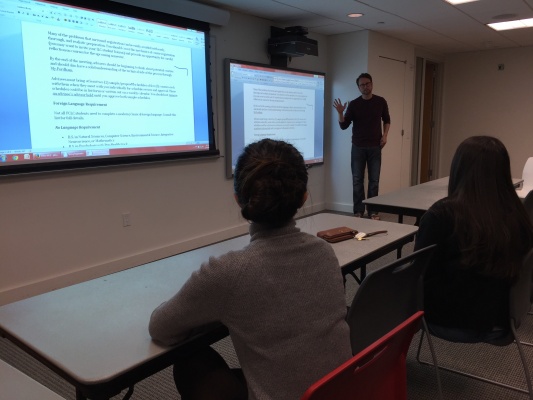How Do Students Pick Their Classes?
Dean Joseph Desciak advises students on how to pick their classes (PHOTO BY YUNJIA LEE/THE OBSERVER)
November 20, 2015
The spring 2016 semester is right around the corner and Fordham students are once again faced with the process of registering for classes.
Joseph B. Desciak, assistant dean of freshmen at Lincoln Center, suggests that students focus on taking core classes before rushing into their major.
“I always recommend that freshmen overload on core, because the chances of them changing majors and programs is high, and why not dabble in some of the core instead of rushing into the major?” Desciak asked.
Although the core curriculum is a high priority, students also consider course material and professor ratings in choosing their classes. Some students do their research on the infamous website RateMyProfessors, created as a space for students to anonymously publish reviews about their past professors.
Vileza Ruhani, Fordham College at Lincoln Center (FCLC) ’15, is an avid user of Rate My Professor. “I would pick a class that seems ‘light work’ and taught by a passive professor because I knew I’d get a better grade,” Ruhani said.
There are also the unlucky few who encounter glitches during their attempts to register and end up in less-desirable courses as a result of closed-reserve.
Jessica Luszczyk, FCLC ’16, said she was worried about not getting into the few classes that would allow her to continue interning. “My schedule is already limited, so I knew I needed to get into those classes. But the website froze, and by the time it cleared up, classes were full,” Luszczyk said.
When asked to explain the registration process at Fordham, Desciak sympathized with students and the stress of the registration period.
“Registration creates undue stress,” he said, adding, “People think registration just begins and ends, but there is fluctuation as time moves forward. For whatever reason, we’ve created an unfair culture of stress and it shouldn’t be like this.”
Students seem to agree with Desciak’s thoughts, noting it as “unfair, limited and stressful,” according to Fiona Metaliaj, FCLC ‘15.
“I had to take the easier professors because the economics major is innately difficult … I needed a competitive GPA in order to be accepted into the masters of econ program,” she said.
Both Ruhani and Metaliaj were committed to Rate My Professors and agreed that their class choices were heavily based on the reviews they read on the website. They only took a professor with bad ratings when they had no choice.
“Honestly, those reviews are so accurate. Every professor I have read reviews on prior to taking their classes have turned out to be mirror images of those reviews,” added Ruhani.
However, Desciak seemed to have a different understanding of students’ reliance on Rate My Professors. “When students ask my thoughts on course offerings and I tell them the professor is a scholar, but a challenge, most students don’t mind,” he said.
Although many students trust professor ratings, some upperclassmen had an opinion similar to that of Desciak.
Emilie Deleers, FCLC ’16, reads professor reviews, but does not think they should be the major factor in registration.
“If my schedule is class-heavy, I’ll ask my friends about the professors and then check reviews. If a professor has some good and some bad, I most likely won’t take the bad into account,” Deleers said. Deleers also thinks many negative reviews are posted by students who do poorly in their classes and are hostile towards professors.
Desciak and upperclassmen have pointed to clear discrepancies in Fordham’s registration system. The commonly-noted issue seems to be class size. Those who register last are least likely to get the classes they need or want because class sizes are generally small.
If upperclassmen wait to finalize core requirements prior to graduation, classes fill up quickly before underclassmen have a chance to register. This is one of the reasons why Desciak expressed frustration over students who waited until their final semesters to take the classes they’ve dreaded for so long. “This is the ripple effect. It’s not good and it pushes freshmen back,” Desciak said.
Desciak also conveyed that registration troubles can be alleviated if students are well-informed, and has begun conducting in-person seminars to help freshmen with the process.












